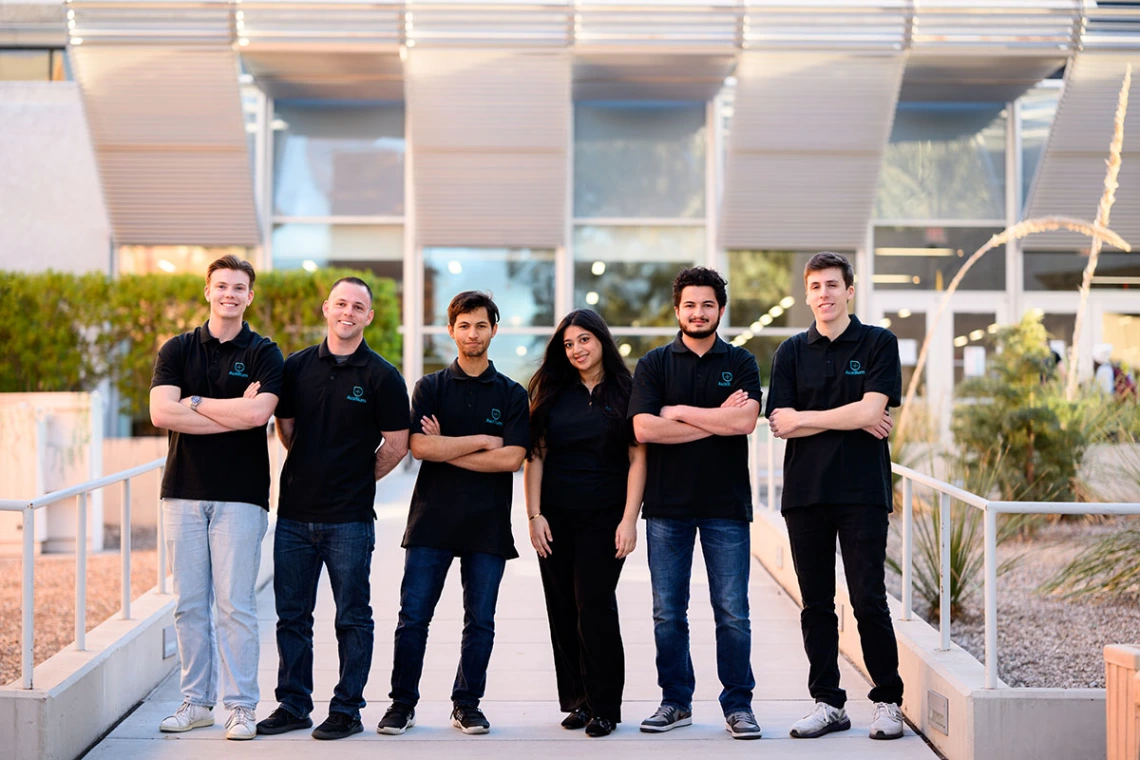Students Advance the Work of Prior Capstone Teams

The members of Team 24008 are working with Auxilium Technology Group to build the template for an industrial-scale cement printer aimed at giving mining waste a new life.
It’s crunch time for seniors taking part in the Craig M. Berge Engineering Design Program. Nearly 100 teams are fixing bugs, repairing equipment, and making tweaks as they finalize their projects in preparation for judging and display at Craig M. Berge Engineering Design Day on April 29.
Auxilium Technology Group, a Tucson engineering firm that provides zero-waste, regenerative solutions for mine waste, producing metals, reagents, water and carbon negative building materials, is sponsoring Team 24008 in creating a three-axis rail system that will be a template for a larger, industrial-scale cement printer that uses mine tailings – rocks and other materials left over from the mining process. Like many capstone projects, this one is in its second year, building off research done by last year’s seniors.
“As with any ambitious project, the development process is part of the learning curve. Significant fundamental progress was made for us at Auxilium to have conviction on renewing for a second year,” said Abraham Jalbout, the CEO of Auxilium. “The student team is amazing, and we have seen the benefits of working with them both for advancing an engineering challenge but also to source future talent.”
Another team is working on a second-year project to create what they call a “wired room” to aid with medical diagnostics. Don McDonald, the faculty mentor for Team 24042, explained that the idea is to record audio biometric information on patients as they are in the consultation room with their physicians.
“We hope to dramatically improve the 10 to15 minutes a doctor has with a patient,” he said. “It would pick up extraneous sounds from a cough, for instance, and the stethoscope would be wired directly into the system. All that would be fed into an analytic system.”
It would also record video information, to provide information on things like gait and finger movement tendencies for analysis.
McDonald is no stranger to the Interdisciplinary Capstone program. He first judged capstone projects almost 10 years ago.
“I wanted to lend my knowledge and support to the school, and Jeff Goldberg, the dean at the time, said I could be a judge, and I found it really interesting.”
It wasn’t long before McDonald was mentoring projects, and sponsoring them as well. This year, McDonald is in his second year of sponsorship, backing a project to help researchers understand the aging brain, which he is also mentoring.
“Brains age and develop problems at different rates,” he said. “The idea is to study the brain under a vast variety of circumstances.”
Team 24018 is improving a tether system used to track rat movements and record neural data as the rats move through a space and see visual stimuli, as well as redesigning and building a new robotic device that is part of the research.
Rikit Makhija, an electrical and computer engineering major who is the project lead, said that McDonald’s counsel throughout the project has been very helpful.
“He is guiding us to answers and products that are available that we would not know about otherwise,” Makhija said. “He is also giving us a sense of what the real world of engineering will be like once we leave here, which is very valuable.”

